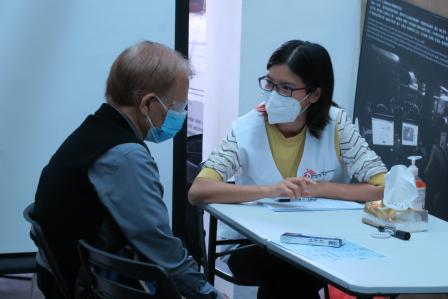Hong Kong: The elderly and vulnerable groups must not be isolated in any future outbreak response
Doctors Without Borders team provides free medical consultation and vaccination for vulnerable groups such as the elderly and people experiencing homelessness. Hong Kong, 2022. © Jessica Wong/MSF
Amidst the 5th wave of COVID-19 infections in Hong Kong, the magnitude and severity of the crisis left the elderly and vulnerable groups isolated and their medical and mental health needs overlooked. The city overall had more than 70,000 Omicron infections during the peak in early March, and a high death toll amongst unvaccinated elderly that has caused concerns.
To tackle the needs of these vulnerable groups outside of the hospital settings, Doctors Without Borders / Medecins Sans Frontieres (MSF) has collaborated with the Society of Community Organization (SoCO) and Shoebill Healthcare for a series of vaccination drives in Sham Shui Po, one of the hardest hit districts by Omicron surge, since early March. The collaboration has helped a community of the elderly, of people experiencing homelessness, and low-income earners with free medical consultations, health education, and inoculation to prevent them from suffering severe COVID-19 infections.
Dr Joyce Ching, an Doctors Without Borders doctor, says that during the pandemic, one of the most critical issues she witnessed was social breakdown or isolation. “I have seen many older people lose their self-care skills, and it is even worse if they already have mild cognitive impairment. One patient told me he used to go for a walk from Kwai Chung to Tsim Sha Tsui frequently by himself. But now he doesn't recognise the route anymore and doesn't know how to take the MTR,” she said.
Doctors Without Borders staff shows the patient the rapid antigen test pack information. Hong Kong, 2022. © Jessica Wong/MSF
In one of the medical consultations during the vaccination drive, Dr Joyce met an elderly woman who lives alone. She was worried about her health condition, rheumatoid arthritis, as she had not been able to go to the hospital since the 5th wave hit.
“Although we cannot provide specific medical advice when we don’t have the patient’s medical history,” says Dr Ching, “the lady was thankful for the opportunity to speak with someone. We talked about her memories about her hometown and so on, and I felt that our conversation helped us build trust and a relationship.”
Another cause of concern that goes unnoticed by the general public is about the homebound elderly. Ivan Lin, a community organiser of SoCO says he has also faced a tremendous challenge supporting those groups living in Sham Shui Po.
Doctors Without Borders team provides free medical consultation and vaccination for vulnerable groups such as the elderly and people experiencing homelessness. Hong Kong, 2022. © Jessica Wong/MSF
“They have tiny social networks and not enough current medical information. They also cannot afford the fee for private clinics. So, when they tested positive for COVID-19, their social worker is often the only one they could seek help from. The tremendous pressure was handling medical-related questions like the meaning of severe symptoms or what kind of medicine I should take. I remember one time I tried to teach an older person who lived alone to use a rapid antigen test kit on the phone. But when he tried to put the long stick in his nose, it made it bleed. I was so worried about him, but there was nothing I could do at that moment. If a doctor or nurse could do a home visit, things might be different.”
Ivan added, “Having been through the outbreak since 2020, I believe that safety-net health systems play an essential role in providing care to low-income and vulnerable populations. As a social worker, I have been proud of myself and my colleagues for working with people who are the most vulnerable. On the other hand, we hope we are not the only ones they can call for help in the future.”
Doctors Without Borders’s Dr Ching says that lessons should be taken from this recent experience. There needs to be a wider application of the things that are shown to work.
What can be replicated for future outbreaks is the current approach where both support on medical consultations and the provision of jabs are offered free and accessible, as well as availability of other wellbeing support on site for the vulnerable groups.Dr Joyce Ching, Doctor
The Doctors Without Borders team in Hong Kong has been focusing its response amongst the elderly groups who are most susceptible to severe infections and deaths during the 5th wave of COVID-19 infections in collaboration with several organisations. Other disadvantaged groups, such as low-income families and those who have difficulty in finding credible medical and health information because of those language barriers, e.g. foreign domestic workers, were also prioritised. Health education and mental health coping tips were part of this service.
